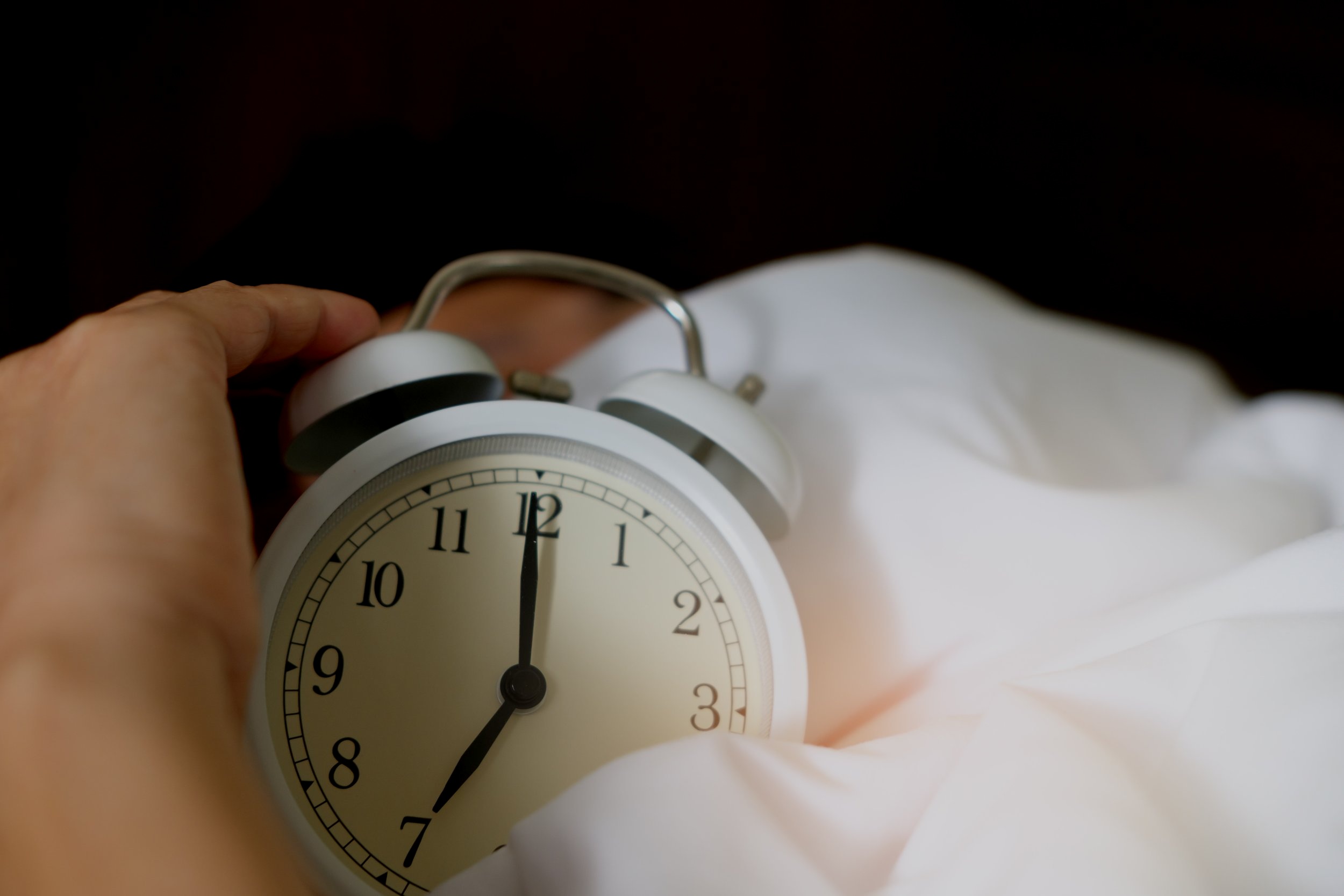Staying Awake: Addressing Sleep Deprivation in College Athletes

It’s no great secret that college students aren’t getting enough sleep. For many, it’s practically a point of pride. Walk on to any college campus and you’ll probably hear students boasting about how they stayed up all night studying for their midterm exam, or how they only made it to class because they chugged half a pot of coffee after going to a party on a Tuesday night. College is a calendar-filler, and when you’re constantly trying to balance your 16 credit hours with your clubs, social life, homework, and finding an internship, sleep has a way of falling by the wayside.
"...On average, NCAA student-athletes report four nights of insufficient sleep per week (the average American adult reports two) and that one-third of student-athletes get fewer than seven hours of sleep per night (compared to the recommended 7-9 hours for young adults)."
And of course, when you add on top of all of that the packed itinerary of being a college athlete, the problem only gets exacerbated. Considering the intense practice schedule, travel for competitions, and desire to spend time with their teammates, it’s no wonder that, on average, NCAA student-athletes report four nights of insufficient sleep per week (the average American adult reports two) and that one-third of student-athletes get fewer than seven hours of sleep per night (compared to the recommended 7-9 hours for young adults).
Some athletes might view this as something to strive for, operating under the assumption that a sleepless lifestyle is what you have to push yourself to in order to be successful. But, in fact, the opposite is true — given the physical, emotional, and cognitive consequences of sleep deprivation, it’s essential that athletes get enough sleep if they want to perform their best. Student athletes and athletic trainers should make it a priority to monitor and improve their sleeping patterns in order to enhance their performance.
Physical Consequences
A possible underlying assumption to the idea that you can “push through” sleep deprivation is the thought that it’s all in your head. Your brain just feels tired, so as long as you’re strong enough mentally, you can grin and bear it — right? Wrong. Failing to get enough sleep on a regular basis can also affect your body physically. For instance, the healing that occurs when we’re asleep is essential to muscle growth, as our bodies work to repair the damage inflicted during practice or games and recharge for the next day. Poor sleep patterns or shorter sleep durations can also lead to weight gain. So if you’re neglecting to get your eight hours in every night, don’t be surprised if you’re struggling a bit the next time you hit the weight room.
Emotional Consequences
It shouldn’t come as a surprise that a lack of sleep affects our emotions in a negative manner. After all, if we asked you to close your eyes and picture someone who’s sleep-deprived, we’re guessing you wouldn’t be imagining someone with bright eyes and a big smile across their face. And for student-athletes in particular, a positive mood is key to a healthier and happier lifestyle. Sleep deprivation can lead to irritability and problems with relationships, as well as serious mental health conditions such as depression and anxiety. Any of these conditions alone could lead to a decreased performance on the field or in the classroom — all of them combined could be catastrophic.
Perhaps most importantly, sleep provides us with the energy, focus, and lowered blood pressure we need to deal with stress — and with the pressure to maintain their GPA while succeeding in their sport, student-athletes are rarely strangers to stress. That sort of worrying is often the kind of motivator that can push student-athletes into making unhealthy lifestyle choices, such as craving junk food or over-consuming alcohol. So while your stress about the exam tomorrow or the big game this weekend might be the very thing encouraging you to stay up late, consider instead the alternative benefits of a good night’s rest.
Cognitive Consequences
When we’re asleep, our mind sorts through, evaluates, and integrates all of the information we took in during the day, meaning that a lack of sleep can actually result in a loss of memory. Additionally, sleep loss impairs our decision-making skills, our ability to focus and think clearly, and our reaction time. Obviously this can all result in negative consequences on both sides of the student-athlete coin. An individual who can’t focus or react quickly will perform just as poorly on their calculus test as they will at their lacrosse game.
But the cognitive implications of sleep deprivation extend into our everyday lives as well. Staying awake for 22 hours straight has the same effect on your reaction time as consuming four alcoholic drinks. So getting behind the wheel while sleep-deprived can be just as dangerous as driving under the influence. In fact, drowsy driving is responsible for thousands of car crashes every year, many of them fatal. Driving while sleep deprived is just one of many potential distractions while driving. Considering all they have to lose, student athletes should be proactive about getting enough sleep to keep themselves and their teammates safe.
Greater Risk of Injury
In addition to the increased risk that accompanies any sort of cognitive impairment (see above), sleep deprivation can put an athlete at a greater risk for injury in general. While recommending a later school start time for middle and high school students, Dr. Jim MacDonald from The Ohio State University, cited studies that found that sleep deprivation is linked to both overuse and fatigue injuries. Dr. Brian Hainline of the NCAA pointed to a study that showed that “if an athlete is progressively sleep deprived over a period of 12 weeks, their neuromuscular performance will continue to diminish, even when the athlete believes that, after three days, they are back to normal.” If nothing else, this increased chance of injury should be enough to motivate athletes to seek a better sleep schedule.
Getting More Sleep
Okay, you might be thinking, but what can we really do? Given the difficult demands of a student-athlete’s schedule, you’d be forgiven for thinking that there’s simply no way around the lack of sleep. And while the occasional late-night study session won’t kill you, you should make an effort to establish an adequate and habitual sleep schedule — and there are plenty of small steps you can take to do so.
One important action is to reduce your amount of screen time before bed. Because this generation of student athletes grew up in the digital era, they’re more prone to ending the day by looking at their phone or TV or computer. In fact, a National Sleep Foundation poll found that teenagers engage in an average of four electronic activities after 9 p.m. While this can be a nice way to unwind after a stressful day or to get some extra work done on assignment before calling it a night, this late-night use of multiple devices has been associated with less nocturnal sleep and more daytime drowsiness. Additionally, studies have suggested that the light emitted from our screens can suppress melatonin levels and disturb the circadian rhythms that regulate our internal sleep schedules.
Another thing to decrease is — gasp! — caffeine consumption. We know — sometimes that extra cup of cold brew is the only thing getting you through your 1:15 Bio lecture. But in addition to having adverse effects on an athlete’s mood and heart health, caffeine can disrupt our sleep patterns. And while it may seem impossible to cut back, keep in mind that caffeine contributes to an unhealthy cycle of drowsiness and sleep deprivation. In other words, if you manage to decrease the amount of caffeine you drink, you’ll be able to sleep more, and with that improved rest, you’ll crave less caffeine!
The NCAA also recommends that athletic departments get involved in maintaining its athletes’ sleep health. By initiating comprehensive sleep disorder screenings and monitoring and assessing athletes’ sleep behaviors, athletic trainers can help athletes better plan their schedules, as well as detect harmful sleep disorders such as insomnia and sleep apnea.
Overall, the most efficient way to a healthier sleep pattern is simply establishing a regular schedule. No matter how much work you have, try to set regular lights-out and wake-up times. And lights-out means lights-out — maybe leave your phone across the room so you’re not tempted to check it while falling asleep. If you’re anxious about your demanding schedule, just remind yourself that the time you “lose” by not pulling an all-nighter will be more than made up for by the mood, health, and well-being you’ll gain from your good night’s sleep.
![HR Logo [Recovered]_Full Color Vertical-1](https://blog.healthyroster.com/hs-fs/hubfs/HR%20Logo%20%5BRecovered%5D_Full%20Color%20Vertical-1.png?width=199&height=178&name=HR%20Logo%20%5BRecovered%5D_Full%20Color%20Vertical-1.png)

.jpg)
